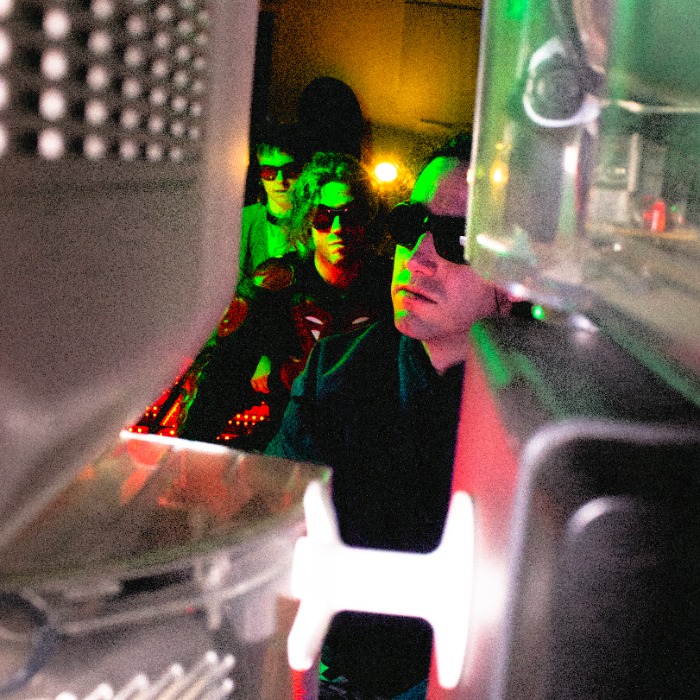Machine Girl
New York, NY
Machine Girl have always operated as an inimitable, inventive, and individual sonic phenomenon. The newly trio’d—Matt Stephenson [vocals, producer], Sean Kelly [drums], and Lucy Caputi [guitar]—fortify a punk exoskeleton with electronic alchemy and cinematic ambition outfitted for an uncompromisingly heavy attack. Rave, metal, punk, and pummeling electronic (and real) drums collide and splinter like shrapnel into kaleidoscopic blasts of vibrant color and visceral sound.
After amassing millions of fans, hundreds of millions of streams, inciting critical acclaim, and captivating at cap crowds in nineteen (19) countries YTD in 2025 so far, the band continue to elevate on their seventh full-length LP, Psycho Warrior.
“I’d been reading analytical psychology and the writings of Joseph Campbell and Jung,” recalls Matt. “There’s a concept of the collective unconscious and these archetypes that we innately have. We adopt different personae in order to get through the day. In essence, you complete yourself by facing your shadow self. To do so, you must accept the less savory aspects of who you are. There’s a lot of validity to these theories. Right now, we’re a very psychologically damaged culture and society. We’re being pushed over the edge with social media and technology. Any chance of resistance against these systems starts in the mind, so this was the genesis of Psycho Warrior.”
Machine Girl carved out an incomparable lane upon arrival in 2012. Stephenson’s 2014 full-length debut LP, Wlfgrl, achieved bona fide cult status shocked to life by “Out by 16, Dead on the Scene,” “Ghost,” and “Mg1,” which reeled in north of 43 million Spotify streams and counting. Their sound proceeded to completely reinvent itself across each LP that followed - Gemini [2015], …Because I’m Young Arrogant and Hate Everything You Stand For [2017], The Ugly Art [2018], U-Void Synthesizer [2020], and 2022’s two-part Original Soundtrack for the video game Neon White. Most recently, 2024’s MG Ultra incited the most enthusiastic critical applause of the band’s career so far. Pitchfork professed, “Their music together plays like the soundtrack to the final boss level of some finger-blistering bullet hell,” and Dazed mused, “it’s hard to imagine a better soundtrack for the revolution than Machine Girl.”
The latter LP also set the stage for Psycho Warrior, functioning as a prelude.
“MG Ultra is the setup,” reveals Matt. “It explores mind control and brings attention to the overall concepts. It’s Act 1. Sonically, it’s more rave-y, but the songs seem hopeless conceptually. Psycho Warrior was made after, and it follows as Acts 2 and 3 of the same arc. Lyrically, it’s more empowering and anthemic. We worked out a lot of the framework with bass guitar and more punk and metal elements.”
Machine Girl recorded this body of work at Civil Defense Recording Studio between Jan – June 2025 in New York, allowing their vision time to naturally take shape.
Now, the single “Come On Baby, Scrape My Data” layers a guttural bassline atop a woozy old school computer loop, conjuring a frenetic bounce from the depths of cyberspace. Matt’s upbeat punky cadence warbles and wheezes on the verses until culminating on a glitchy chant, Wanna know me? Wanna own me? Wanna clone me? F**k you, you can blow me.
“It was written after experiencing something creepy and fucked up either with A.I. or the surveillance state,” he reveals. “My phone knows me way too well—which is a feeling we’ve all gotten very used to within the last ten years. The song teases big tech companies, taunting them to come and try to take our data and identities. It’s a pretty decisive way to open up the record in terms of attitude.”
Elsewhere, brain-rattling beat-craft sets the tempo for “Rabbit Season.” Neon keys chime and echo off in the distance, and a snappy hook takes hold, “I love the feeling.”
“With Machine Girl’s lyrics, I’ll take some dystopian or dark subject matter and flip it into something more lighthearted,” he notes. “I took the concept of conspiracy rabbit holes and used it to make a bouncy dance track. ‘Rabbit Season’ is obviously a reference to Looney Tunes and Bugs Bunny. It discusses the cartoonish world of conspiracies and false, subjective realities people are trapping themselves inside of.”
Then, there’s “Dread Architect” [feat. Drumcorps]. A relentless drum-n-bass barrage crashes into manic screams underlined by groans of fuzzed-out feedback and laser-precise synths.
“To me, ‘Dread Architect’ is almost the antagonist of the whole double-LP,” he states. “It’s the worst of our war-hungry billionaire class leaders who are seething to create a horrible future. We’re witnessing the destruction of the environment worldwide. Mark Zuckerberg and all of these billionaires have already built bunkers for the apocalypse. They’re trying to get out of here and go to Mars. It’s grim and fucked up. Drumcorps is the de facto metalcore breakcore producer extraordinaire. He provided some super gnarly guitar tracks for us to chop up and use too.”
Back in October 2024, the band had welcomed Lucy as a live member. Formally etching out her place in the fold, she handles lead vocals on “Ignore The Vore.” Matt adds, “It’s the first track where my vocals take a backseat, and Lucy is front-and-center. It was an exciting experiment, and it’s a new form of Machine Girl.”
Nearing the six-minute mark, the epic “Psychowar” revolves around the chug of distorted guitars, piston-like percussion, and paranoid pleas a la, “Pass me the Kool-Aid.”
“The goal was always for it to be prog rock-level, epic, and freaky,” he grins. “It’s linked to the central theme. The lines, ‘Fight your Psychowar,’ refer to confronting the parts of yourself you don’t want to confront, overcoming them, and becoming mentally stronger. The first half is darker. On the second, you’re picking yourself up, working on your shit, fighting your ‘Psychowar,’ and becoming a Psycho Warrior.”
In the end, Machine Girl tap into the sound of self-actualization. It’s gritty, dirty, unpredictable, beautiful, and utterly brilliant.
“We really want the music to be life-affirming,” he leaves off. “Catharsis is important in the world of Machine Girl. This is probably the most cathartic album we’ve made.”
After amassing millions of fans, hundreds of millions of streams, inciting critical acclaim, and captivating at cap crowds in nineteen (19) countries YTD in 2025 so far, the band continue to elevate on their seventh full-length LP, Psycho Warrior.
“I’d been reading analytical psychology and the writings of Joseph Campbell and Jung,” recalls Matt. “There’s a concept of the collective unconscious and these archetypes that we innately have. We adopt different personae in order to get through the day. In essence, you complete yourself by facing your shadow self. To do so, you must accept the less savory aspects of who you are. There’s a lot of validity to these theories. Right now, we’re a very psychologically damaged culture and society. We’re being pushed over the edge with social media and technology. Any chance of resistance against these systems starts in the mind, so this was the genesis of Psycho Warrior.”
Machine Girl carved out an incomparable lane upon arrival in 2012. Stephenson’s 2014 full-length debut LP, Wlfgrl, achieved bona fide cult status shocked to life by “Out by 16, Dead on the Scene,” “Ghost,” and “Mg1,” which reeled in north of 43 million Spotify streams and counting. Their sound proceeded to completely reinvent itself across each LP that followed - Gemini [2015], …Because I’m Young Arrogant and Hate Everything You Stand For [2017], The Ugly Art [2018], U-Void Synthesizer [2020], and 2022’s two-part Original Soundtrack for the video game Neon White. Most recently, 2024’s MG Ultra incited the most enthusiastic critical applause of the band’s career so far. Pitchfork professed, “Their music together plays like the soundtrack to the final boss level of some finger-blistering bullet hell,” and Dazed mused, “it’s hard to imagine a better soundtrack for the revolution than Machine Girl.”
The latter LP also set the stage for Psycho Warrior, functioning as a prelude.
“MG Ultra is the setup,” reveals Matt. “It explores mind control and brings attention to the overall concepts. It’s Act 1. Sonically, it’s more rave-y, but the songs seem hopeless conceptually. Psycho Warrior was made after, and it follows as Acts 2 and 3 of the same arc. Lyrically, it’s more empowering and anthemic. We worked out a lot of the framework with bass guitar and more punk and metal elements.”
Machine Girl recorded this body of work at Civil Defense Recording Studio between Jan – June 2025 in New York, allowing their vision time to naturally take shape.
Now, the single “Come On Baby, Scrape My Data” layers a guttural bassline atop a woozy old school computer loop, conjuring a frenetic bounce from the depths of cyberspace. Matt’s upbeat punky cadence warbles and wheezes on the verses until culminating on a glitchy chant, Wanna know me? Wanna own me? Wanna clone me? F**k you, you can blow me.
“It was written after experiencing something creepy and fucked up either with A.I. or the surveillance state,” he reveals. “My phone knows me way too well—which is a feeling we’ve all gotten very used to within the last ten years. The song teases big tech companies, taunting them to come and try to take our data and identities. It’s a pretty decisive way to open up the record in terms of attitude.”
Elsewhere, brain-rattling beat-craft sets the tempo for “Rabbit Season.” Neon keys chime and echo off in the distance, and a snappy hook takes hold, “I love the feeling.”
“With Machine Girl’s lyrics, I’ll take some dystopian or dark subject matter and flip it into something more lighthearted,” he notes. “I took the concept of conspiracy rabbit holes and used it to make a bouncy dance track. ‘Rabbit Season’ is obviously a reference to Looney Tunes and Bugs Bunny. It discusses the cartoonish world of conspiracies and false, subjective realities people are trapping themselves inside of.”
Then, there’s “Dread Architect” [feat. Drumcorps]. A relentless drum-n-bass barrage crashes into manic screams underlined by groans of fuzzed-out feedback and laser-precise synths.
“To me, ‘Dread Architect’ is almost the antagonist of the whole double-LP,” he states. “It’s the worst of our war-hungry billionaire class leaders who are seething to create a horrible future. We’re witnessing the destruction of the environment worldwide. Mark Zuckerberg and all of these billionaires have already built bunkers for the apocalypse. They’re trying to get out of here and go to Mars. It’s grim and fucked up. Drumcorps is the de facto metalcore breakcore producer extraordinaire. He provided some super gnarly guitar tracks for us to chop up and use too.”
Back in October 2024, the band had welcomed Lucy as a live member. Formally etching out her place in the fold, she handles lead vocals on “Ignore The Vore.” Matt adds, “It’s the first track where my vocals take a backseat, and Lucy is front-and-center. It was an exciting experiment, and it’s a new form of Machine Girl.”
Nearing the six-minute mark, the epic “Psychowar” revolves around the chug of distorted guitars, piston-like percussion, and paranoid pleas a la, “Pass me the Kool-Aid.”
“The goal was always for it to be prog rock-level, epic, and freaky,” he grins. “It’s linked to the central theme. The lines, ‘Fight your Psychowar,’ refer to confronting the parts of yourself you don’t want to confront, overcoming them, and becoming mentally stronger. The first half is darker. On the second, you’re picking yourself up, working on your shit, fighting your ‘Psychowar,’ and becoming a Psycho Warrior.”
In the end, Machine Girl tap into the sound of self-actualization. It’s gritty, dirty, unpredictable, beautiful, and utterly brilliant.
“We really want the music to be life-affirming,” he leaves off. “Catharsis is important in the world of Machine Girl. This is probably the most cathartic album we’ve made.”








